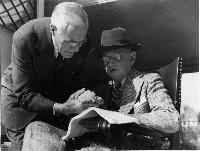From time to time Salisbury had his questions or caveats on particular methods of the Oxford Group, and expressed them freely and courteously. A letter to Twitchell, for instance, suggests that, for the sake of Salisbury's friends, 'an associated body deeply convinced of the main principles of the Group but not committed to its methods' might perhaps be formed. He enclosed a list of caveats: that 'the Group teaching is a true road to God' but not the only road; that though one 'ought to ask for and to receive God's guidance', it 'is not necessarily to be had on demand'; that it is not true that when people become convinced Christians 'according to Group methods or any other methods ... the fierce warfare of the Christian soul is over'; and that it is 'a Christian obligation to share those spiritual experiences which are a help to others' but not to treat all such experiences as public property. He added a further warning: 'The fact is that an undue and insecurely founded optimism involves considerable danger. There must be a reaction sooner or later, perilous to the individual who experiences it, and it may be disastrous to the fellowship and teaching which may be held to be responsible for it.'32

Such warnings did not in any way interrupt Salisbury's co-operation with his Group friends. Two days after this letter he saw Lord Halifax, and asked him to sign a letter supporting the Oxford Group33 which he was assembling and which appeared in The Times eight days later.34 Halifax felt unable to do so; but two years later, when Foreign Secretary, sent a public message of support to Buchman and his friends in America.35*
(* In the spring of 1939, Rose writes (pp. 100,101), Salisbury began to arrange another house-party at Hatfield 'to consider practical steps for the promoting of Moral Re- Armament in this country'. 'The Archbishop of Canterbury readily agreed to take part... Other eminent men...sent their regrets...The guest list dwindled into mediocrity. As if at a word of command, Buchman's henchmen turned spitefully on Salisbury.' Rose then quotes from two letters, one from a future bishop, the other from the son of a bishop. 'Salisbury replied to these impertinences with Christian meekness,' he concludes. One deplores both the tone and the content of these letters, while admiring the grace of the recipient. They do, however, dispose of Rose's inference that Oxford Group leaders would go to almost any lengths to obtain an influential patron.)
Salisbury accepted Buchman and more particularly his younger British colleagues as friends engaged in a Christian battle in which he wished to have a part. When, in 1942, Buchman suffered a stroke, he asked Roland Wilson to say 'to Dr Buchman that my thoughts are daily with him during these anxious moments through which he is passing and with concern and prayer for the great movement for which he is responsible'.36 He also attended Wilson's wedding in 1946, although 85 years old, and telephoned him the day before he died in the next year.
253
Photo: Buchman (right), who suffered a stroke in 1941, is examined by an old friend, Dr Loring Swaim.
©Arthur Strong/MRA Productions